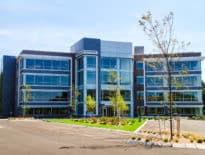
A bus serving the MBTA's Route 28 pulls into the Nubian Square terminal. Photo by King TransitMA | CC BY-SA 4.0
With MBTA buses rolling by behind her as she spoke, Boston Mayor Michelle Wu announced Wednesday morning that three of the most important bus lines in Boston will be free for two years as part of a pilot project funded by federal COVID-19 relief funds.
Wu had pledged $8 million in city funds to the idea of making the 23, 28 and 29 buses fare-free on her first day in office, but negotiating the details with federal transit regulators meant the program didn’t get the OK to begin until recently and won’t formally start until March 1. The MBTA’s route 28 is currently fare-free under a shorter-term pilot project launched by Kim Janey, Wu’s predecessor as mayor.
At the triumphant press conference in the heart of Boston’s Grove Hall neighborhood, Wu linked the pilot to efforts to advance equity – the three lines connect largely-minority and working-class areas of Mattapan, Dorchester and Roxbury with local shops and jobs downtown – and efforts to make the T’s buses more reliable.
“We know bus service is the best place to start because it’s speeding up our buses every time people don’t have to unfold their dollar bills or rifle through their bag,” she said, adding that more reliable buses are key to offering city residents viable alternatives to driving.
Jascha Franklin-Hodge, Boston’s chief of streets, said the fare-free pilot on the 28 bus reduced boarding time by 20 percent and sent ridership up to roughly 12,000 boardings per day, making it the most-used line in the T’s network and one of the few to bounce back to roughly pre-pandemic ridership. MBTA statistics show the 23 bus is similarly popular, carrying 11,810 people every weekday diagonally across the city from the Ashmont Red Line station to the Ruggles Orange Line station. The 29 mimics the 28’s route, traveling up Blue Hill Avenue from Mattapan Square in the city’s far south, but splits off at Grove Hall to land at the Jackson Square Orange Line station instead of continuing north to Nubian Square and Ruggles.
“This bus gives me the opportunity to do my grocery shopping, go to my physical therapy for my disability, and having it be free is a gift that keeps on giving,” said Peggy James, a 28 bus rider invited by Wu to speak at Wednesday’s press conference.
Wu said the pilot would also help boost ridership when the city builds planned bus rapid transit infrastructure on Blue Hill Avenue, calling the fare-free service “economically transformative” by putting money back in residents’ pockets and making it easier for them to attend schools and shop at local businesses.
Franklin-Hodge said the city will be issuing a more detailed analysis of the Route 28 fare-free pilot in the coming weeks, and said the city and the MBTA will be analyzing and reporting data on the three-route fare-free pilot as it unfolds over different seasons.
Wu, who championed the idea of a fare-free MBTA long before running for mayor, told reporters she hopes the three-route pilot proves the concept of a fare-free transit system, although she acknowledged that the city would need help “from other levels of government” to fund the pilot after the federal COVID dollars are used up.
“I think there are some important questions about funding that would need to be answered in that context,” MBTA General Manager Steve Poftak said at the press conference. “We stand willing to cooperate with our municipal partners who want to do this kind of work.”
In response to past criticism of fare-free projects as unsustainable, Wu called the costs “relatively small” and cited estimates by advocacy groups that it would only take around $60 million to make all public buses fare-free statewide.




 |
| 

